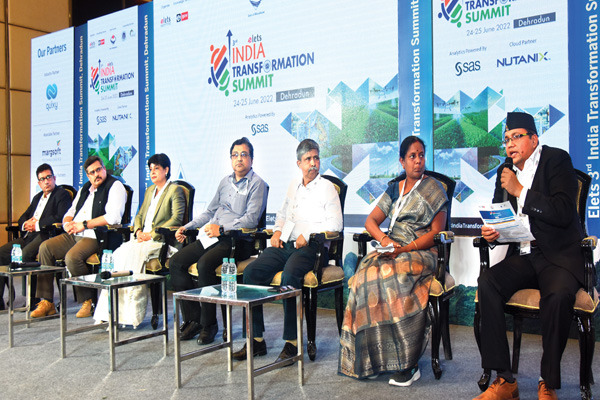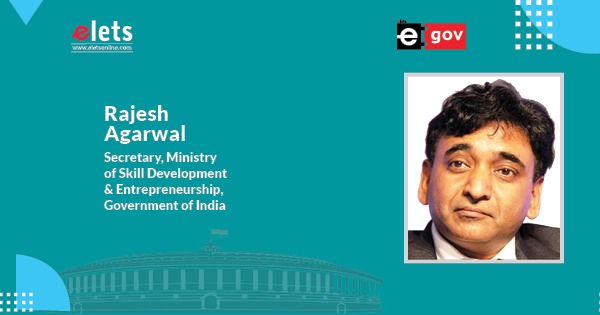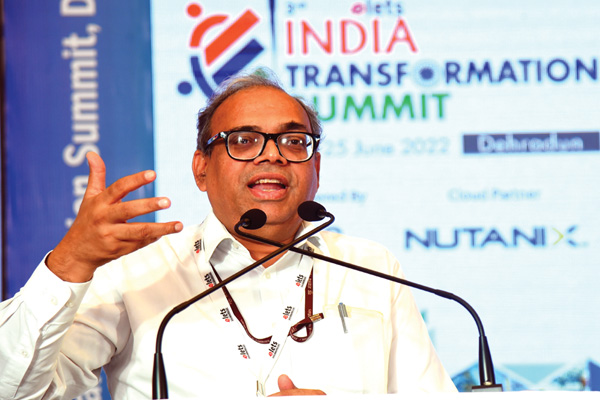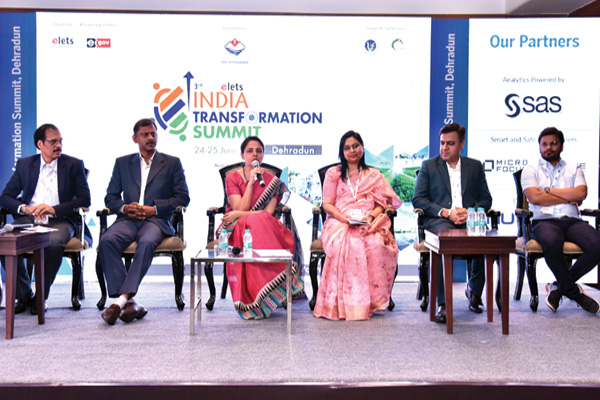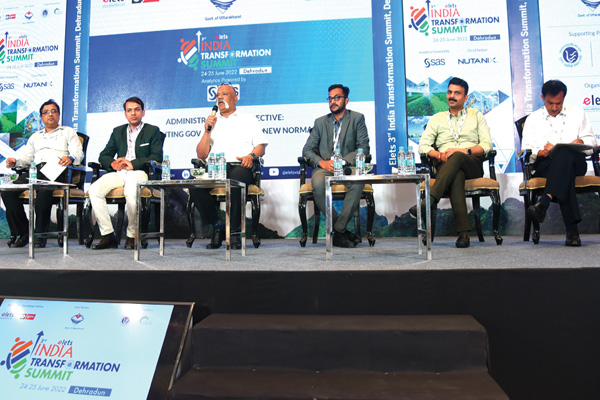
The increased level of automation through various government initiatives and significant contribution by the private sector has catapulted India as one of the best digitally driven economies in the world. Highlighting this, Dr. Rajendra Kumar, Additional Secretary, MeitY, Government of India; Abhishek Singh, Chief Executive Officer, NeGD, Government of India; Dr. Sunil Panwar, Chief Executive Officer, Centre for e-Governance, Government of Karnataka and Gautam Nimmagadda, Founder & Chief Executive Officer, Quixy, spoke at the Elets India Transformation Summit.
The Digital India programme has truly transformed the country in the last four to five years. Being in the top 20 economies in the startup ecosystem index, the tech-driven Indian economy is on its way to further take this journey forward.

Dr. Rajendra Kumar, Additional Secretary, Ministry of Electronics and Information Technology, Government of India
Elaborating on the steps taking digital governance and services to the next level, Dr. Rajendra Kumar, Additional Secretary, Ministry of Electronics and Information Technology, Government of India, said that we must develop a system where citizens through one online application can find their eligibility for all the services provided by the government digitally, or the government department itself reach out to citizens individually, telling them about availing various services one is eligible for. This will further ease out the process and make service delivery more efficient and convenient.

He said, “So far, the model that we have followed in India across all the states is that the government departments digitise one service, they put it online and then that online portal or the website has a section for creating a user profile where you fill information, then request for surveys, and the department verifies your eligibility etc. Now, even that is online in most cases, but this is the most usual format now.”
“So, we must do away with the need of filing multiple forms for availing services digitally. That would ease out a whole host of issues,” he added.

“The fact is digital illiteracy still prevails in many parts of the country where citizens are still not aware how to avail government services online. This is where the role of proactive governance becomes crucial. We must empower those who are currently at the margin to truly transform our digital journey,” he further said.

Abhishek Singh, Chief Executive Officer, NeGD, Government of India
Technology has transformed our economy. From agriculture to education, from farming to finance, from fransport to trade, it has catapulted India into an efficient and empowered economy. Abhishek Singh, Chief Executive Officer, NeGD, Government of India, shared his detailed insights into the way several digital initiatives taken in the last half a decade have transformed our economy.
“Projects like Aadhaar, UPI and DigiLocker have brought positive changes in people’s lives. They are more empowered now and better equipped. They do not need to run from pillar to post for availing of any service as these are easily accessible online. Nearly 4000 plus services are being offered digitally and it speaks volumes of our resilient and robust digital economy. As a result, several countries have expressed the desire to replicate India’s digital model in their jurisdictions,” he told the gathering at the summit.
He further said that no country in the world has built their digital infrastructure of that level as ours. Comparing our robust digital facility with that of the UK, he mentioned how the poor digital infrastructure in the UK resulted in leakages in the distribution of services and welfare benefits provided during the COVID pandemic. “They struggled to track various services being provided online. Lots of people would wait in the queue. Whereas in India, digital services came very handy during the pandemic,” Singh added.
He said that “monetary assistance, food, or medical assistance were being provided online which mitigated administrative hassles.”
Projects like Aadhaar and UPI have brought positive changes in people’s lives. Nearly 4000 services are being offered digitally and it speaks volumes of our resilient and robust digital economy. As a result, several countries have expressed the desire to replicate India’s
digital model. — Abhishek Singh
Extolling the virtues of our strong digital infrastructure, he said the online portal COWIN, created during the onslaught of COVID, for a smooth vaccination drive, had helped India in navigating the complexities and various technicalities involved in such a mammoth exercise.
He said, “Facilities such as teledoctor, telemedicine, prescriptions, lab reports and information about the hospitals were given through the COWIN portal. In the health sector, for instance, AI-enabled frontier technologies are helping to save lives, diagnose diseases and extend life expectancy.”
“In education, virtual learning and distance learning opportunities have opened up programmes to students who would otherwise be left out. Blockchain-powered systems are making public services accessible and accountable and also mitigating administrative hassles. Big data can also support more responsive and accurate policies and programmes,” Singh concluded saying.

Dr. Sunil Panwar, Chief Executive Officer, Centre for e-Governance, Government of Karnataka
Having spent 7-8 years in the field of digital service delivery, Dr. Sunil Panwar, Chief Executive Officer, Centre for e-Governance, Government of Karnataka, said that he could see a clear transformation in the sector. Referring to citizen service delivery, he shared four important focus areas where greater focus was needed to be given.
First aspect, he said, is that there is a need that all the services should be served on one platform and there should be a Citizen Service Guarantee Act to oversee the entire process. He mentioned how the portals like Seva Sindhu of Karnataka, Saral of Haryana, Me Seva of Andhra Pradesh are delivering a plethora of services on one single platform, rendering service delivery mechanisms easy and convenient for the masses.
The second thing, according to him, is proactive delivery of services. He gave the example of Delhi government’s initiative of doorstep services delivery.
The major focus area should be on building a separate Enterprise Resource Planning (ERP), for specific sectors, to further boost the automation in the country, thereby rendering the online service delivery mechanism more efficient. — Sunil Panwar
Next focus area, he said, those states which have not digitised their services, must take a shortcut and start proactive service delivery in order to ensure they do not fall behind other states in this regard. He mentioned states must learn from platforms like “Bhama Shah” of Rajasthan and “Kutumba’’ of Karnataka that contain all the databases on one platform.
And the last focus area, he said, should be on building a separate Enterprise Resource Planning (ERP) for specific sectors. Emphasising the need of greater collaboration between government and the industry, he said that online service mechanisms like Auto Eligibility, Automatic Deprivation Index cannot be made effective without such support.
He concluded by saying that industry and government must work together for a better e-Governance system.

Gautam Nimmagadda, Founder & Chief Executive Officer, Quixy
Hailing the remarkable digital transformation of the country in the last decade, Gautam Nimmagadda, Founder & Chief Executive Officer, Quixy, said the automation process resulting from a series of government initiatives has brought a greater efficiency and transparency in registering business or in delivery of online services.
He said that when he came to India in 2011 after having completed his masters in the US, he observed the registration process for starting a business was very lengthy and cumbersome. “We are only a 2.5 year-old startup but we are growing very rapidly. We are a no code platform and we allow processes to be automated ten times faster,” he said, adding that ease of doing business in India was encouraging new business and startups to come up.
He mentioned that, in his research, he found out that the level of automation currently stands at only 20 per cent in the world, which offers great opportunities for startups working in this direction. He said that the government initiatives like Digital India, UPI, Aadhaar etc, have laid a foundation for a whole lot of applications to be built using this platform, to further boost the automation in the country. The level of automation within the government department, for eg. Enterprise Resource Planning (ERP), is not very prevalent which is affecting the delivery of online services to citizens.
He concluded by saying that “we must take it to the remaining 80 per cent to reach an optimum level of automation.”
Be a part of Elets Collaborative Initiatives. Join Us for Upcoming Events and explore business opportunities. Like us on Facebook , connect with us on LinkedIn and follow us on Twitter, Instagram.


